|
De Belgische dichter en schrijver Leonard Nolens werd geboren in Bree op 11 april 1947. Zie ook alle tags voor Leonard Nolens op dit blog.
Kier
Laat dit niet alles zijn, dit leven stil en donker
Als het maandelijks bloeden van de vrouwen.
Laat mij van iemand zijn, maar ook niet zo volstrekt
Dat ik verdwijn, in haar, in hem, of weg moet gaan
Omdat geen mens mijn menselijk gewicht kan tillen.
Uit schrik voor mijn gezicht schrijf ik dit op.
Altijd ben ik onderweg. Ik vind geen rust
Bij mij, ben bang als jij mijn trage stap hoort branden
Op de koude tegels in de gang naar jou.
De deur gaat open. En zoenend en stom onderzoeken je lippen
De sombere man die jou zwijgend staat aan te blaffen
Met liefdesgedichten. Geef hem je bed. Laat alle deuren
Op een kier.
Noordkant
Als zij thuis is kan ik hier het zuiden horen.
Zij is het licht dat mij zijn kern te eten geeft
En straalt tot in de koudste hoeken van mijn leven.
Alle warmte die ik ben komt hier van haar.
Dat ooit een mens mij zo brutaal, zo helemaal
Heeft aangekeken, met een blauw dat ging en gaat
Tot op het botste van mijn mannelijke leegte,
Dat ooit twee handen hier zo gruwelijk intiem
Mijn bloed gingen betasten, elke blote zenuw
Van het kind dat er onvindbaar in mij sliep,
Dat doet mijn oude dood nog pijn, dat maakt mij ziek
Van geluk dat ik met haar niet delen kan.
Als zij weg is blijf ik achter met de schaamte
Van de jongen die zijn moeder wil bezitten, hurk ik
Neer onder de rok van haar afwezigheid en neurie
Onverstaanbaar de zoete ellende van mijn geboorte.
Stof
Vier vrouwen hebben mij gebaard en gezoogd en gewiegd.
Ze droegen me 's middags en 's avonds naar de hemel
Van mijn kamer en wasten mijn vleugels en kleedden me uit.
Ze kleden me uit en ze bidden me niet meer in slaap.
Doe dat maar zelf! Doe dat voortaan maar zelf!
Vier vrouwen lagen op hun knieën voor mijn bed te zingen.
De enkele vader zit beneden, overstemt de bovenwereld
Met zijn stilte, pent er zijn hartgrondige verslagen
Over de herkomst en erfeniskwesties van de aardbol neer.
Zijn moegezworven dood verkavelt alle slijk onder mijn voet.
Op alle plaatsen waar hij jaar na jaar begraven wordt
Veeg ik zijn stof bijeen en spuw erin
En kneed mezelf weer heel
En vloek dat ik hem lief moet hebben als de mond
Waarmee ik dit leven bedenk en mijn kinderen kus.
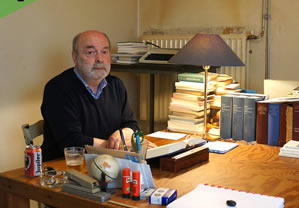
Leonard Nolens (Bree, 11 april 1947)
De Amerikaanse schrijver Glenway Wescott werd geboren op 11 april 1901 in Kewaskum, Wisconsin. Zie ook alle tags voor Glenway Wescott op dit blog.
Uit: A Visit to Priapus
« Naturally, bitter regret for my great days as a lover assailed me. Also a fresh and terrible kind of sense of devotion to the two whom I love, who love me, who cannot keep me happy, whom I torment and disappoint year in and year out, ached in my grotesque heart. With which my pride also started up, at its worst. To think that I should have come to this: sex-starved, in a cheap provincial hotel humbly waiting for a total stranger; and it should be so soon, at thirty-eight! But, I must say, then a certain good nature quickened in me as well, thank God; an amused appreciation of myself. Once more I summoned up courage to believe—scowling a little, grinning a little, gritting my teeth—that in the considerable brotherhood of middle-aged men in unlucky sexual plight, not many are my peers in this respect and that respect at least. G.D. on the Bowery. A.E.A. or B.K. in Turkish baths: my ventures no doubt are as undignified as theirs, my sensations probably less rapturous than theirs, but ... But my life is the oddest. As a result of years of perfect intercourse, unforgettable, my self-consciousness is extraordinary. Living as I do, undivorced—with those I have most desired still the closest to me—I am embar-rassed in the pursuit of pleasure by their alluring noble example; handicapped by trickery of my own spirit, my own flesh; impover-ished by tribute. Nevertheless I have been able to keep a more level and subtle head than G.D., a more fearless temper than A.E.A., a soberer habit than B.K. In the very efficacy of my excitements there is something like a practical morality. My very sense of humor about it all seems somehow poetical. And if I ever have occasion to tell this tale, for example, I shall tell it well. So I said to myself, boasted to myself ... By that time, with mechanical eye, I had read Time from cover to cover. In any case I could not take any further interest in the sad international facts it so blithely reported, nor any other particular facts, not even the facts of my presence where I was, and why, and what would come of it. I was under an introspective spell. I was interested in only the wondrous tiresome way my mind works, always the same way, no matter what it has to do, incorruptible by what it has to deal with. It was fascination of only the sense of life in general, in the abstract, all of a piece: life of which, like everyone else alive, I am daily, gradually, dying ... Which mystic fit, as it might be called—in almost entire forgetfulness of time and place and purpose and self—seemed the purest kind of experience of all. »
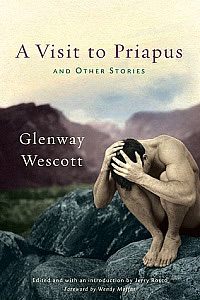
Glenway Wescott (11 april 1901 - 22 februari 1987)
Cover
De Amerikaanse dichter en schrijver Mark Strand werd geboren op 11 april 1934 in Summerside, Prince Edward Island, Canada. Zie ook alle tags voor Mark Strand op dit blog.
When the Vacation is Over for Good
It will be strange
Knowing at last it couldn't go on forever,
The certain voice telling us over and over
That nothing would change,
And remembering too,
Because by then it will all be done with, the way
Things were, and how we had wasted time as though
There was nothing to do,
When, in a flash
The weather turned, and the lofty air became
Unbearably heavy, the wind strikingly dumb
And our cities like ash,
And knowing also,
What we never suspected, that it was something like summer
At its most august except that the nights were warmer
And the clouds seemed to glow,
And even then,
Because we will not have changed much, wondering what
Will become of things, and who will be left to do it
All over again,
And somehow trying,
But still unable, to know just what it was
That went so completely wrong, or why it is
We are dying.
Old Man Leaves Party
It was clear when I left the party
That though I was over eighty I still had
A beautiful body. The moon shone down as it will
On moments of deep introspection. The wind held its breath.
And look, somebody left a mirror leaning against a tree.
Making sure that I was alone, I took off my shirt.
The flowers of bear grass nodded their moonwashed heads.
I took off my pants and the magpies circled the redwoods.
Down in the valley the creaking river was flowing once more.
How strange that I should stand in the wilds alone with my body.
I know what you are thinking. I was like you once. But now
With so much before me, so many emerald trees, and
Weed-whitened fields, mountains and lakes, how could I not
Be only myself, this dream of flesh, from moment to moment?
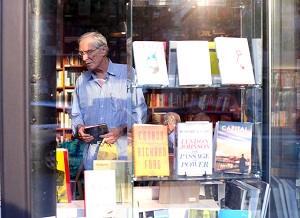
Mark Strand (11 april 1934 – 29 november 2014)
De Italiaanse schrijfster Silvia Avallone werd geboren in Biella op 11 april 1984. Zie ook alle tags voor Silvia Avallone op dit blog.
Uit: Ein Sommer aus Stahl (Vertaald door Michael von Killisch-Horn)
„Die Gestalt in dem unscharfen Kreis des Glases bewegte sich kaum, ohne Kopf.
Ein Stück Haut, her angezoomt im Gegenlicht.
Dieser Körper hatte sich innerhalb des letzten Jahres allmählich verändert unter der Kleidung. Und jetzt, im Sommer, im Fernglas, explodierte er.
Das Auge glitt aus der Ferne über die Details: den Riemen des Bikiniunterteils, ein dünner Streifen Algen auf der Hüfte.
Die angespannten Muskeln über dem Knie, die Wölbung der Wade, der Knöchel voller Sand. Wegen des anhaltenden Starrens durch das Fernglas wurde das Auge immer größer und geröteter.
Der jugendliche Körper sprang aus dem Blickfeld und stürzte sich ins Wasser.
Im nächsten Augenblick tauchte er im mitgewanderten und nachregulierten Fernglas wieder auf mit der ganzen Pracht seiner goldenen Mähne. Und so unbändig lachend, dass es dich auch aus dieser Entfernung allein durch den Anblick schüttelte. Und dazu die Grübchen auf den Wangen und die Mulde zwischen den Schulterblättern und die Einbuchtung des Bauchnabels und alles Übrige.
Sie spielte wie ein Mädchen ihres Alters und ahnte nicht, dass sie beobachtet wurde. Sie riss den Mund auf. Was sie wohl sagte ? Und zu wem ? Sie warf sich in eine Welle, und als sie wieder aus dem Wasser auftauchte, war ein Dreieck des Bikinioberteils verschoben. Auf der Schulter war ein Mückenstich zu erkennen. Die Pupille des Mannes verengte und weitete sich wie unter dem Einfluss von Rauschmitteln.
Enrico beobachtete seine Tochter, es war stärker als er.
Er spionierte Francesca vom Balkon aus hinterher, nach dem Mittagessen, wenn er keine Schicht im Stahlwerk Lucchini hatte. Er verfolgte sie, betrachtete sie durch das Fernglas.“
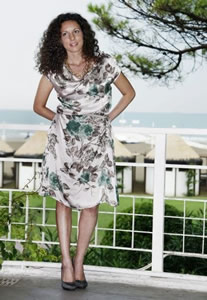
Silvia Avallone (Biella, 11 april 1984)
De Tunesische dichter, schrijver, essayist en vertaler Walid Soliman werd geboren op 11 april 1975 in Tunis. Zie ook alle tags voor Walid Soliman op dit blog.
Uit: Three hours in Fiumicino (Vertaald door Jason Casper)
“I said to her, smiling, “Happy Birthday! And many more!” “Thanks. But I had wished to celebrate with my family and friends.” “Don’t worry about it. Sometimes life forces one to do things he doesn’t really want.” While she was saying that, I was thinking of something I might give her as a present, but the only thing I found was my silver keychain representing Tanit. I took off the one key attached to it and gave it to her, saying, “Here’s a humble present for you; sorry, it’s the only thing I have.” After initial reluctance she accepted the gift, and the appearance of her face indicated she liked it. She thanked me, and asked what it represented. “Its Tanit,” I replied, “the Phoenician fertility goddess. It is said among us that she brings good luck. I hope it works for you.” At this point she asked me my name, and as it appeared a bit strange to her she asked if it had any specific meaning, which I explained to her. Then in turn I asked her hers. “My name is Anabella, but my friends call me Anna. Take your pick.” “They’re both pretty, but I’ll call you Bella, since truly you are.[2]” “Alright. If you really think so, then why not?” We talked about travel, and I asked if she enjoyed it. She told me it was the greatest passion in her life, and that she spends almost her whole income on it. She took her turn to ask me the same question, and I said yes. That’s why she appeared a bit perplexed why I said in reality I don’t generally enjoy the trips I take. I explained my travel was usually for business, which took all my time leaving little for pleasure. »
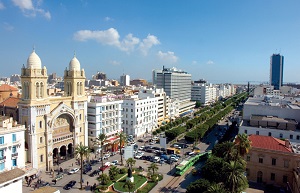
Walid Soliman (Tunis, 11 april 1975)
Tunis
De Franse schrijver, essayist en uitgever Hubert Nyssen werd geboren in Boendael aan de rand van Brussel op 11 april 1925. Zie ook Zie ook alle tags voor Hubert Nyssen op dit blog.
Uit: Le monologue de la concubine
« Mais le troisième ou le quatrième jour, après avoir repris du bon temps au glouton, tu as déballé une histoire qui m’a glacée jusqu’au cœur… Je venais d’essuyer la sueur dont tu étais couvert, et toi, les yeux baissés, tu m’as appris que tu n’étais pas un célibataire tombé du ciel . Tu étais arrivé en avant-garde, tu avais une femme, une infirmière encore bien, et deux filles qui débarqueraient bientôt.
- Tu n’aurais jamais dû me faire un coup pareil, mon bébé !
Le premier jour, tu m’aurais dit que tu avais une tribu, je ne t’aurais pas repoussé, je me serais dit que le ciel nous avait offert une java. Et plus tard tu serais reparti sans que ça laisse autre chose que des petits regrets à conserver bien au chaud
- Pas des cicatrices comme celle que tu m’as laissées ! »
(…)
« Je te jure, Bruno, je n’ouvre plus ma porte avant des semaines. La dernière fois, c’était hier... On sonne, on frappe, on cogne, j’ouvre… une Chinoise. Elle me regarde avec des yeux comme des meurtrières, elle me dit qu’elle a été ton étudiante, puis ta disciple, et elle veut que je lui donne tes papiers, tes archives, parce qu’elle va écrire un libre sur le professeur Bruno BONOPERA.
- Non, mais quoi encore ? C’est vite dit, une disciple !
Si tu avais vu … une disciple, elle prononçait le mot en pinçant sa bouche sans lèvres. Comme elle y allait… Tu n’étais même pas encore enterré !
- C’était peut-être une de tes petites putains, vieux salaud…
Et puis un livre sur un type qui n’as pas été fichu d’en écrire lui-même, ni d’avoir son nom dans un dictionnaire ou dans les gazettes, et encore moins à la télévision, non merci !
Mais quand je dis que tu n’as pas eu ton nom dans les journaux, ce n’est pas tout à fait vrai. Il y a l’affaire d’Athènes. Là, on peut dire que les journaux grecs ont parlé de toi, titres en manchette, dessins, photos."
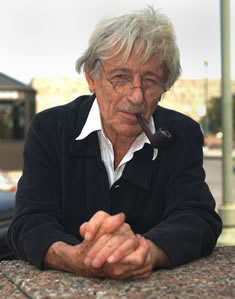
Hubert Nyssen (11 april 1925 – 12 november 2011)
De Amerikaanse schrijfster Dorothy Allison werd geboren op 11 april 1949 in Greenville, South Carolina. Zie ook Zie ook alle tags voor Dorothy Allison op dit blog.
Uit: A Question of Class
« The first time I heard, "They're different than us, don't value human life the way we do," I was in high school in Central Florida. The man speaking was an army recruiter talking to a bunch of boys, telling them what the army was really like, what they could expect overseas. A cold angry feeling swept over me. I had heard the word they pronounced in that same callous tone before. They, those people over there, those people who are not us, they die so easily, kill each other so casually. They are different. We, I thought. Me.
When I was six or eight back in Greenville, South Carolina, I had heard that same matter-of-fact tone of dismissal applied to me. "Don't you play with her. I don't want you talking to them." Me and my family, we had always been they. 'Who am I? I wondered, listening to that recruiter. 'Who are my people? We die so easily, disappear so completely—we/they, the poor and the queer. I pressed my bony white trash fists to my stubborn lesbian mouth. The rage was a good feeling, stronger and purer than the shame that followed it, the fear and the sudden urge to run and hide, to deny, to pretend I did not know who I was and what the world would do to me.
My people were not remarkable. We were ordinary, but even so we were mythical. We were the they everyone talks about—the un-grateful poor. I grew up trying to run away from the fate that destroyed so many of the people I loved, and having learned the habit of hiding, I found I had also learned to hide from myself. I did not know who I was, only that I did not want to be they, the ones who are destroyed or dismissed to make the "real" people, the important people, feel safer. By the time I understood that I was queer, that habit of hiding was deeply set in me, so deeply that it was not a choice but an instinct. Hide, hide to survive, I thought, knowing that if I told the truth about my life, my family, my sexual desire, my history, I would move over into that unknown territory, the land of they, would never have the chance to name my own life, to understand it or claim it.”
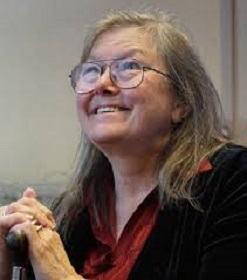
Dorothy Allison (Greenville, 11 april 1949)
De Duitse dichteres en schrijfster Barbara Köhler werd geboren op 11 april 1959 in Burgstädt. Zie ook alle tags voor Barbara Köhler op dit blog.
Rondeau Allemagne
Ich harre aus im Land und geh, ihm fremd,
Mit einer Liebe, die mich über Grenzen treibt,
Zwischen den Himmeln. Sehe jeder, wo er bleibt;
Ich harre aus im Land und geh ihm fremd.
Mit einer Liebe, die mich über Grenzen treibt,
Will ich die Übereinkünfte verletzen
Und lachen, reiß ich mir das Herz in Fetzen
Mit jener Liebe, die mich über Grenzen treibt.
Zwischen den Himmeln sehe jeder, wo er bleibt:
Ein blutig Lappen wird gehißt, das Luftschiff fällt.
Kein Land in Sicht; vielleicht ein Seil, das hält
Zwischen den Himmeln. Sehe jeder, wo er bleibt.
Lösung, Turner
Langsam löst sich das bild
auf vor den augen. Langsam
löst es sich von der wand.
Löst sich langsam in nebel
licht und bewegung langsam
liegt’s nicht mehr auf der
hand. Langt nicht mehr hin
hält nicht mehr fest sieht
nicht mehr stellt es nicht
her weht geht in die augen
kreisen und fallen wirbeln
weisses wie schnee und wie
dunkel es fällt kristallen
so kalt ein sturm ein halt
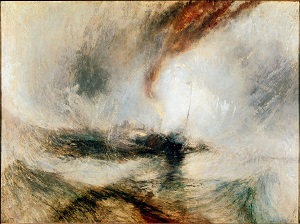
Barbara Köhler (Burgstädt, 11 april 1959I
Snow Storm door J. M. W. Turner, 1842
De Duitse dichter Rolf Schilling werd geboren in Nordhausen in de Harz op 11 april 1950. Zie ook alle tags voor Rolf Schilling op dit blog.
Garten und Gedicht
Wie gleicht doch dieser Garten
Einem Gedicht von dir,
Da jeglichem Erwarten
Wird noch Erfüllung hier.
Wie ist er reich an Farben,
Gleich offen und compakt
Für Sonnen-Widders Garben
Und Drachen-Kamm gezackt.
Zu Rotem, Grünem, Blauem
Kommt goldenes Gegleiß,
Und ob der Herbst mit rauhem
Zugriff dies Glück zerreiß -
Du bannst es zu genauem
Vers-Maßwerk Schwarz auf Weiß.
Septemberlich
Du mußt dich ruhig halten,
Und übernimm dich nicht,
Laß Waage-Geister walten
Im Garten, im Gedicht.
Im Wandel der Gestalten
Fällt, was im grellen Licht
Sich trachtet zu entfalten,
Nicht wirklich ins Gewicht.
So laß in sanfter Schwebe,
Was dir ist ausersehn
Von Rose, Schilf und Rebe,
Septemberlich erstehn,
Als ob der Wind verwebe
Sein Flüstern seinem Flehn.
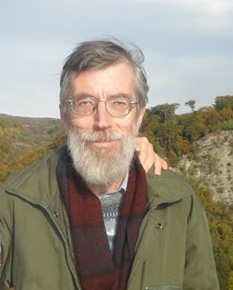
Rolf Schilling (Nordhausen, 11 april 1950)
Zie voor nog meer schrijvers van de 11e april ook mijn blog van 11 april 2015 deel 1 en eveneens deel 2 en ook deel 3.
|



